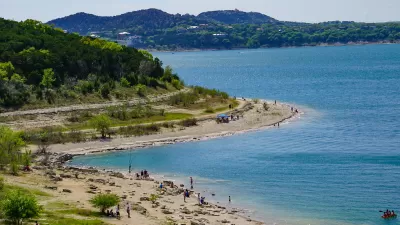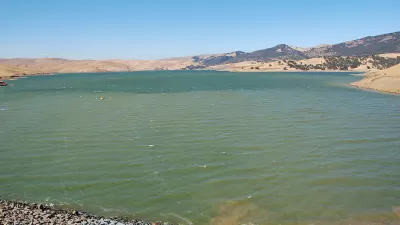The Dallas-Fort Worth region is seeking to boost its water supply by building a new reservoir that opponents claim would destroy thousands of farms, homes, and jobs.

With a regional population projected to grow to almost 15 million people by 2070 and worsening drought brought on by climate change, water planners in North Texas are proposing conservation and mitigation measures that include a controversial reservoir, reports Bret Jaspers.
The proposed Marvin Nichols Reservoir would flood 66,103 acres and provide additional water to the Dallas-Fort Worth metroplex.
The Marvin Nichols Reservoir is sponsored by three water wholesalers, including the North Texas Municipal Water District, Tarrant Regional Water District, and the Upper Trinity Regional Water District. Those agencies sell to utilities all across the metroplex. The water from Marvin Nichols Reservoir would serve people from Anna to Benbrook, Kaufman to Chico.
Many local residents oppose the project, arguing that other conservation measures could enhance the region's water supply without the environmental and financial damage the reservoir would bring. But cities in the area have failed to enforce watering restrictions or encourage less water-intensive landscaping, while water costs remain low. As Jaspers notes, "R.J. Muraski, an assistant deputy with the North Texas Municipal Water District, said 'water’s very, very reasonable right now in the Metroplex.'"
With the future of the reservoir still uncertain, residents wait to find out whether they will be forced to relocate.
FULL STORY: Population growth — and climate change — may force Texans to change how they find and use water

Alabama: Trump Terminates Settlements for Black Communities Harmed By Raw Sewage
Trump deemed the landmark civil rights agreement “illegal DEI and environmental justice policy.”

Planetizen Federal Action Tracker
A weekly monitor of how Trump’s orders and actions are impacting planners and planning in America.

The 120 Year Old Tiny Home Villages That Sheltered San Francisco’s Earthquake Refugees
More than a century ago, San Francisco mobilized to house thousands of residents displaced by the 1906 earthquake. Could their strategy offer a model for the present?

In Both Crashes and Crime, Public Transportation is Far Safer than Driving
Contrary to popular assumptions, public transportation has far lower crash and crime rates than automobile travel. For safer communities, improve and encourage transit travel.

Report: Zoning Reforms Should Complement Nashville’s Ambitious Transit Plan
Without reform, restrictive zoning codes will limit the impact of the city’s planned transit expansion and could exclude some of the residents who depend on transit the most.

Judge Orders Release of Frozen IRA, IIJA Funding
The decision is a victory for environmental groups who charged that freezing funds for critical infrastructure and disaster response programs caused “real and irreparable harm” to communities.
Urban Design for Planners 1: Software Tools
This six-course series explores essential urban design concepts using open source software and equips planners with the tools they need to participate fully in the urban design process.
Planning for Universal Design
Learn the tools for implementing Universal Design in planning regulations.
Clanton & Associates, Inc.
Jessamine County Fiscal Court
Institute for Housing and Urban Development Studies (IHS)
City of Grandview
Harvard GSD Executive Education
Toledo-Lucas County Plan Commissions
Salt Lake City
NYU Wagner Graduate School of Public Service





























